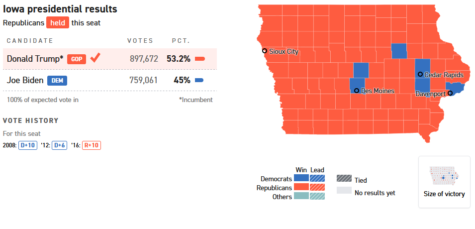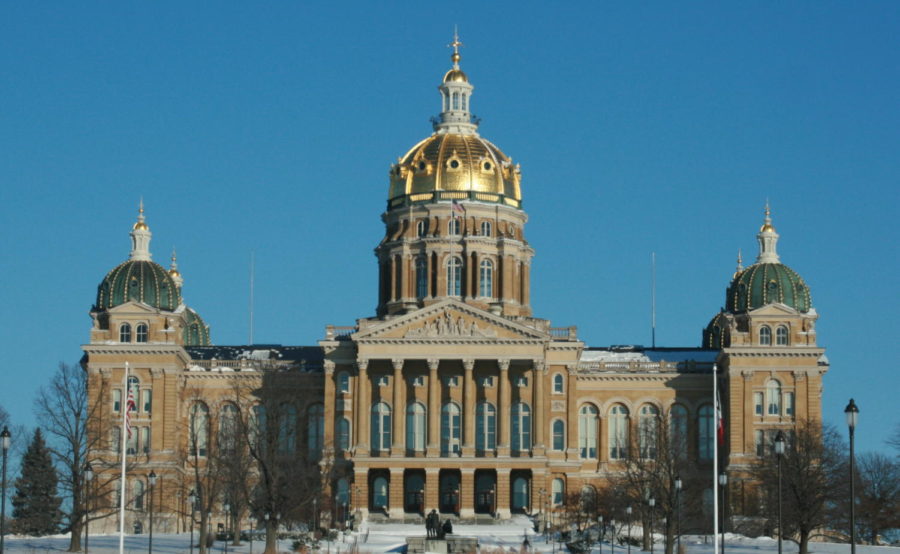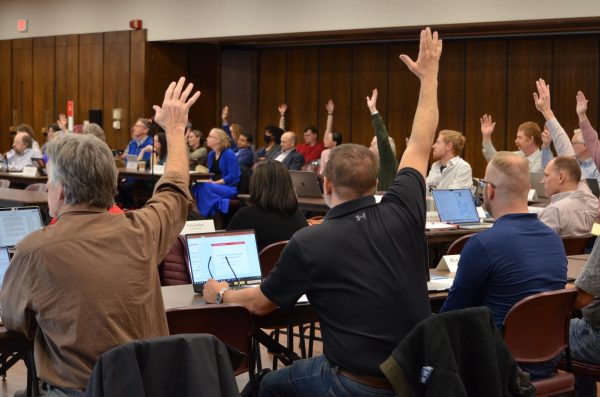Iowa Democrats fight for first-in-the-nation caucus
Iowa’s state capitol in Des Moines, Iowa
Iowa Democrat’s first in the nation caucus status is up for grabs and Mack Shelley, university professor in political science, said the national party has lost incentive to keep the state as a front runner.
In April, the Democratic National Committee [DNC] voted to open the nominating calendar for the presidential election, which put Iowa’s traditional first in the nation status in jeopardy.
Shelley said the DNC does not favor caucasus, adding that since Iowa is not very competitive for Democrats, the DNC does not have any incentive to keep the first primary in Iowa.
“If something bordering on a miracle happens and Democrats win major offices in the Nov. 8 elections this year, the attitude might change a little bit,” Shelley said.
Shelley said Iowa’s relative size in conjunction to how polarized the state has become could potentially play a key role in the DNC’s decision.
“One way to summarize this is that Iowa’s got about 3.2 million people, which is about 0.95 or so percent of the entire country’s population– that’s less than 1 percent,” Shelley said. “So why should a state that small, especially one in which the Democrats don’t do real well, lead the pack at least on the Democratic side?”
According to Politico, Donald Trump won Iowa against President Joe Biden by a difference of 138,611 votes in 2020, with Trump getting 53.2% of the votes cast. Biden had received 45% of the vote.

“[Iowa’s polarization is] not purely because of Trump’s effect, but Trump certainly compounded the Democrats’ problems in the state,” Shelley said.
Ross Wilburn, chair of the Iowa Democratic party, said in a statement to the Iowa State Daily that the party is taking a pragmatic approach to the situation.
“Small rural states like Iowa must have a voice in our Democratic Presidential nominating process,” Wilburn stated in the email. “We cannot let corporate media and special interest groups replace our strong Democratic grassroots organizations which have been the bedrock of our national general election victories.”
Wilburn added that one of his priorities currently is to recruit college aged voters.
“Right now, my main focus is on the upcoming midterm elections and encouraging younger Iowans to get involved,” Wilburn said. “From reproductive rights to student debt, it’s critical that college students show up to the polls and make their voices heard this November.”
Shelley said when he first came to Iowa in 1979, the state was fairly politically competitive. He said Iowa’s seats in Congress were regularly split between Democrats and Republicans.
“The Democrats in Iowa were able to win elections for important races,” Shelley said. “Not so much anymore.”
Aside from serving as a hotspot for candidates to campaign in, Shelley said having the first primary in the nation comes with prestige.
“There’s a reason why New Hampshire fights to have the first primary, and Iowa fights to have the first caucus,” Shelley said. “You know, it says that you’re more than just a flyover state.”
Daniel Sunne, a graduate student majoring in history who holds an undergraduate degree in political science, said he has caucused before. He said his overall experience with Iowa’s caucus has been fun and that the caucus is important to Iowa.
“I think that the Democratic Party has lost a lot of ground in Iowa,” Sunne said, “I come from Northeast Iowa, from some of those river towns, and my relatives are some of the blue-collar union Democrats who are voting Trump and Republican. The Democratic Party would be doing itself a disservice to ignore some of those voices.”
Your donation will support the student journalists of the Iowa State Daily. Your contribution will allow us to purchase equipment, send our student journalists to conferences and off-set their cost of living so they can continue to do best-in-the-nation work at the Iowa State Daily.













